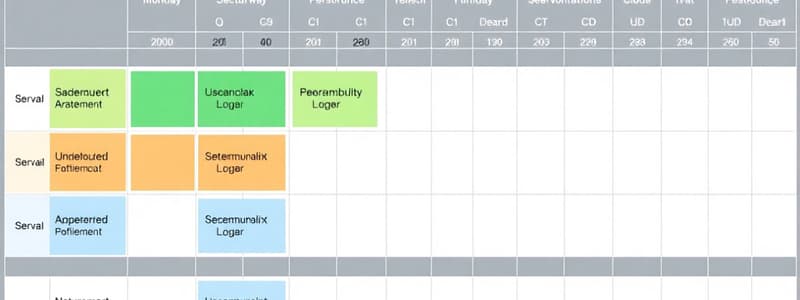Podcast
Questions and Answers
Which of the following descriptions best defines internal stakeholders in a construction project?
Which of the following descriptions best defines internal stakeholders in a construction project?
- Social organizations advocating for community involvement.
- Government bodies that oversee regulatory compliance.
- External entities with a financial interest in the project.
- Individuals and groups directly involved in the project's execution. (correct)
What is one consequence of failing to address stakeholder issues in a timely manner?
What is one consequence of failing to address stakeholder issues in a timely manner?
- It results in immediate project cancellation.
- It increases the number of stakeholders involved.
- It leads to a reduction in project funding.
- It can cause delays due to unexpected discoveries later on. (correct)
Which of these groups is NOT typically considered a stakeholder in construction projects?
Which of these groups is NOT typically considered a stakeholder in construction projects?
- Community advocacy groups.
- Television journalists. (correct)
- Local government entities.
- Contractors and subcontractors.
What role does a project scheduler primarily play in relation to stakeholders?
What role does a project scheduler primarily play in relation to stakeholders?
Which types of stakeholders might require consideration due to their specific interests in the project's phases?
Which types of stakeholders might require consideration due to their specific interests in the project's phases?
What is the primary purpose of the baseline schedule in project management?
What is the primary purpose of the baseline schedule in project management?
Which of the following elements is critical for accurate updating of schedule progress?
Which of the following elements is critical for accurate updating of schedule progress?
What does the baseline schedule provide concerning project progress and deviations?
What does the baseline schedule provide concerning project progress and deviations?
What types of changes must be integrated into the schedule model according to change management principles?
What types of changes must be integrated into the schedule model according to change management principles?
What is one major challenge that arises when significant changes occur on a project?
What is one major challenge that arises when significant changes occur on a project?
Flashcards are hidden until you start studying
Study Notes
Stakeholders
- Stakeholders are individuals or groups with an interest in a project, their interest can be positive or negative.
- Stakeholder interest may be short-term or last the entire project duration.
- Stakeholders can be individuals, groups, social or political organizations, government entities, professionals, the owner, contractors, subcontractors, suppliers, tradesmen and tradesmen organizations.
- Stakeholders can be external or internal to the project.
- External stakeholders have interests that must be understood and addressed by internal stakeholders.
- Stakeholder interests may change throughout the project lifecycle.
- Failing to address an issue at the appropriate time can cause delays.
- Project schedulers will be involved in addressing stakeholder issues.
Baseline Schedule
- The baseline refers to the schedule model used to meet the project execution plan, approved for project execution.
- It reflects the contractor's intended workplan and is used to measure progress, identify trends, and changes.
- The baseline schedule is used to measure progress and identifying trends and changes.
- It identifies the initial critical path and serves as the basis for measuring progress and schedule deviation.
- It's the foundation for cash flow planning, resource management, cost and schedule forecasting, and reporting.
Tracking Schedule Progress
- Reporting progress is vital to the schedule updating process.
- The process includes identifying update input, logic changes, reporting periods, and actual dates for completing activities.
- The scheduler must incorporate these requirements into schedule analysis, forecasting, and reporting
- The scheduler is responsible for understanding and using scheduling software functions when updating progress.
Schedule Change Management
- Changes, such as suspensions, delays, and disruptions, must be integrated into the schedule model.
- Change may arise from modifications to the project scope, changing circumstances, or external influences.
- Changes can be positive or negative and can have an impact on both the current and baseline schedules.
- When changes occur during a project, the plan for change management may need to be adapted.
- Significant changes may require a new baseline.
- Policies and procedures are essential to accurately evaluate and implement progress.
- Variances and trends falling outside accepted norms require corrective action, recovery plans, and potential scope changes.
- Thresholds are guidelines for the project team to identify potential concerns or issues needing action to keep the project on schedule.
Schedule Analysis
- Network activity schedule models allow for identifying float values for critical and non-critical activities.
- Schedule analysis informs the scheduler about "what-if" scenarios and helps monitor and control schedule sensitivity to changes.
- Careful review and analysis are crucial as schedule assessment can be complex.
- Understanding manual calculations of forward and backward passes is essential, as well as the computer scheduling program used to analyze critical points in the schedule.
- Critical path analysis requires understanding the mechanics of the software used to model and analyze the schedule.
- Properly developed critical path analysis assists in developing recovery or work-around alternatives to minimize the impact of changes and delays.
Schedule Forecast
- Forecasts are crucial for project control as they provide information for developing corrective action alternatives and recommendations.
- Once the forecast is accepted by stakeholders, it becomes the basis for developing an updated baseline for monitoring and controlling projects.
Management Summary
- Management summary reporting provides concise overviews of project status for management stakeholders.
- It presents key metrics and information to ensure transparency and avoid surprises.
- It assists management in decision-making regarding resources, risks, and broader aspects of project execution.
Principles in Schedule Development
- Schedules are developed and maintained throughout the planning process.
- Schedules reflect the plan, cost estimate, resource allocation, and execution strategy to meet project objectives.
- Schedules must accommodate and account for changes.
- Successful schedules are elastic, sensitive, complete, robust, and clear for all stakeholders.
Schedule Development
- Once the project is defined and the contract awarded, a detailed schedule of the work is developed.
- Constraints are factors that affect the start, finish, or duration of an activity and the criticality of the project.
- Examples of constraints include calendars, date restraints, resources, weather, and physical limitations.
- Calendars are used to determine activity durations and overall project duration.
- Multiple calendars may be used in a project, including global, workday, resource, weather, environmental, seasonal, contractor, and owner-constrained calendars.
Milestones
- Milestones are zero-duration, key events that the project team must incorporate into the schedule.
- Milestones can be imposed contractually or internally for progress monitoring.
- All stakeholders must agree upon milestones before the project baseline schedule is approved.
Studying That Suits You
Use AI to generate personalized quizzes and flashcards to suit your learning preferences.




